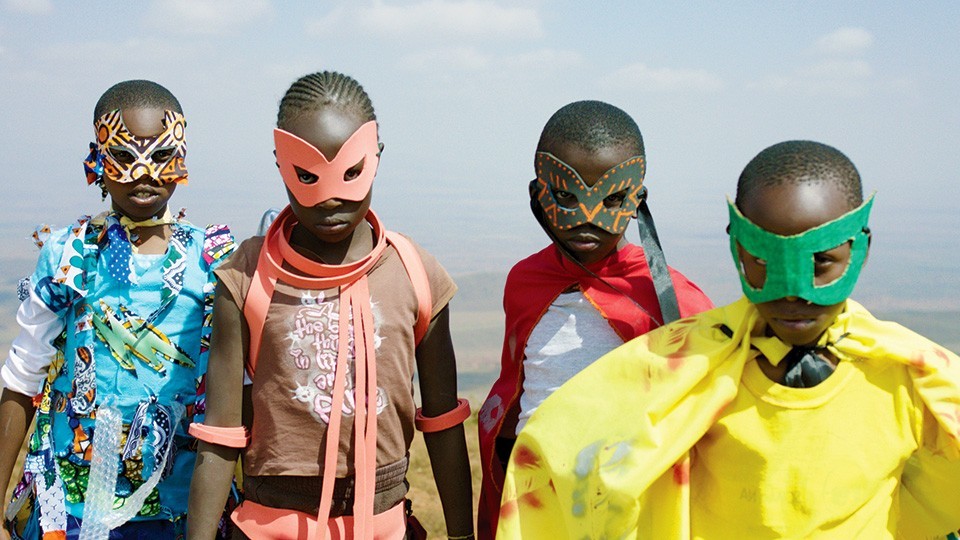In addition to being one of the highlights of the cinematic year, Washington University's annual African Film Festival is a rare opportunity to examine a wide range of cinematic cultures that remain largely unknown to North American audiences. While it's always presumptuous to draw conclusions about a society from only a small sample of its cultural output, the films on display this weekend offer a glimpse of contemporary African residents as they balance centuries of tradition with the encroaching enticements of the 21st century. These eight films — four features and four shorts from five different countries — highlight the ordinary heroism of everyday people as they challenge long-standing views on sexuality, confront political corruption and even provide a comic take on the influence of superhero and kung-fu movies. And admission is free!
Perhaps the clearest example of a modern cultural clash comes from the Kenyan film Rafiki (Friend). Homosexuality is illegal in Kenya, and director Wanuri Kahiu had to sue the government to get the film released. It tells the story of Kena, a young woman in Nairobi who is a model of conformity, working in her father's small shop and studying to become a nurse. Kena's sheltered life is given a major spin when she meets and falls in love with free-spirited, neon-haired Ziki. To add a touch of Romeo and Juliet to the mix, their fathers are opponents in a local election.
Although the director apprises viewers of the dangers facing the women, her story focuses on more mundane challenges — parental disapproval, town gossips, leering neighbors. Kena understands that her life is changing and that nearly everything about it — her sexuality, her education, her desire to become more than a housewife — makes her an outsider. Lifted by Samantha Mugatsia's strong performance as Kena, Rafiki is a brisk, passionate film. It sometimes seems that Kahiu is trying to pack three hours of social concerns into a brisk 83 minutes. Still, you can forgive the slight overreach and admire the sheer energy and compassion.
Starting as a loose, almost plotless human drama and evolving into a story of personal courage and resistance, Borders follows a group of unrelated travelers as they go by bus from Senegal through Mali and Burkina Faso to Nigeria, a journey of more than 1,500 miles. The trip is punctuated by border checks, where armed guards follow a tradition of corruption and abuse.
For much of the film, director Apolline Traoré mirrors the rambling, disconnected nature of the trip with its routine drudgery and isolated altercations between the passengers. Gradually, relationships develop and alliances are formed as four nearly incompatible women reluctantly join together to resist the increasingly violent authorities. Borders is rich in atmosphere, capturing the details of routine bureaucracy and everyday inconvenience, yet ending on a strong note of rebellion and heroism.
The familiar clash between modernity and tradition is the primary subject of Berni Goldblat's Wallay. It's the story of Ady, an unruly, foul-mouthed thirteen-year-old dispatched from his home in Lyon to live with family members in a rural town in Burkina Faso. Placed under the wing of stern uncle Amadou, Ady finds himself in a strange world where smart phones and high-end sneakers have lost their cultural import.
This is, predictably, a coming-of-age story, the tale of a boy who learns about responsibility and maturity by embracing a new environment and lowering his defenses. (Well, not all of them: To Ady's alarm, his uncle's idea of a rite of passage involves an unwanted circumcision.)
Surprisingly, the festival's sharpest analysis of Western culture, as well as its most engaging film, is the family-friendly (give or take a few lines) Supa Modo, presented as its Saturday afternoon "Eye on Youth" selection. Co-produced by Tom Tykwer (Run Lola Run), it's the story of Jo, a terminally ill young girl whose mind races with fantasies of costumed superheroes and acrobatic martial artists.
Jo's distraught mother brings her home from the hospital to ensure that her final days are peaceful and stress-free, but the imaginative Jo has other plans. While she dreams of developing her own superpowers, her teenaged sister Mwix decides to indulge her fantasies, recruiting the entire village to stage elaborate crime scenes that only a nine-year-old superheroine can resolve.
It's silly and charming; in his debut film, director Likarion Wainaina has an appropriately light touch for lively action scenes, and his young star Stycie Waweru is a pure delight. Wainaina makes a brilliant narrative shift in the final 30 minutes when Jo's cinephile pal Mike, objecting to the mass deception, guides Jo in a new direction (think Pee-Wee's Big Adventure).
Maintaining a careful balance between the bittersweet and the outright goofy, Supa Modo doesn't avoid tragedy, but presents Jo's story with such warmth and invention that even the inevitability of her illness offers a genuine sense of redemption.


